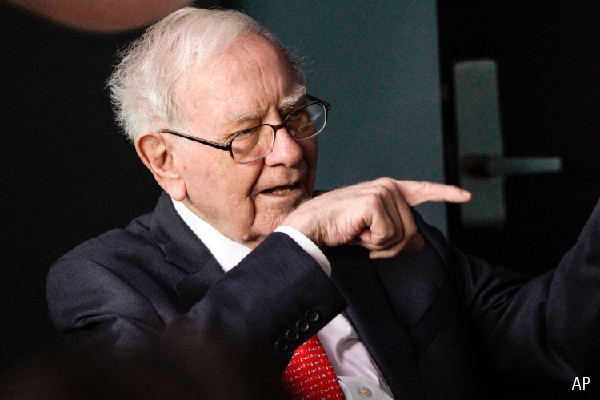Proposal to Remove Warren Buffett as Berkshire Hathaway Chairman Gathers Steam
The proposal calls for the separation of the CEO and chairman positions. Sustainalytics and CalPERS agree.

A proposal in Berkshire Hathaway's BRK.A BRK.B 2022 Proxy Statement has asked that the CEO and chairman positions--both currently held by Warren Buffett--be filled by different individuals. The proposal has drawn support from the California Public Employees' Retirement System, or CalPERS, and opposition from the Berkshire.
The National Legal and Policy Center (which readers may remember from our article on anti-ESG shareholder proposals) asks that Berkshire's board of directors adopt as policy and amend the bylaws as necessary to require that the chair of the board be an independent member of the board, consistent with applicable law and existing contracts. "If the board determines that a chair who was independent when selected is no longer independent, the board shall select a new chair who satisfies the requirements of the policy within a reasonable amount of time," the proposal states.
The National Legal and Policy Center explains that it believes the chairman and CEO roles each have separate and different responsibilities that are critical to the health of a successful corporation and are greatly diminished when held by a singular company official, thus weakening its governance structure.
CalPERS, the United States' largest pension fund, agrees, saying it will vote in favor of the proposal. CalPERS has more than $450 billion in assets under management, including more than $2.3 billion in Berkshire shares.
Berkshire Backing Buffett
Berkshire opposes the proposal, saying "Warren Buffett, Berkshire's CEO, currently has a 32% voting interest in Berkshire. The board believes that as long as Buffett is Berkshire's CEO, he should continue as board chair and as Berkshire's CEO. However, as has been stated on numerous occasions by Buffett in the past, once Buffett is no longer Berkshire's CEO, a nonmanagement director should be named board chair. The board agrees with Buffett and accordingly recommends that the shareholders vote against this proposal."
The 91-year-old Buffett has been chairman and CEO of Berkshire Hathaway since 1970. Charlie Munger has served as vice chairman since 1978. Berkshire has a dual share class structure with two classes of common stock, with Class B shares holding 1/1,500th of the economic rights of Class A shares and 1/10,000th of the voting rights. Buffett is Berkshire's largest shareholder, with a 32.0% voting stake and a 16.2% economic interest at the end of 2021.
Back in October 2018, Buffett, JPMorgan's JPM Jamie Dimon, and BlackRock's BLK Larry Fink called on the two largest exchanges in the U.S., the New York Stock Exchange and Nasdaq, to bring in so-called "sunset provisions" for dual-class stock. This provision would require the share structure to convert automatically to one-share, one-vote "no more than seven years after the IPO date." Despite this, Berkshire Hathaway has two share classes, in order, Buffett claims, to protect the company from short-termist behavior.
Oversight Questions
According to the National Legal and Policy Center filing, "A CEO who also serves as chair can exert excessive influence on the board and its agenda, weakening the board's oversight of management. Separating the chair and CEO positions reduces this conflict, and an independent chair provides the clearest separation of power between the CEO and the rest of the board." It further quotes a 2014 report from Deloitte that concluded, "The chairman should lead the board and there should be a clear division of responsibilities between the chairman and the chief executive officer."
Sustainalytics, a Morningstar company that also provides environmental, social, and governance-focused proxy advisory services, agrees with this position, saying, "Shareholders appoint the board to protect their interests through the oversight of management. We believe that the best way to execute this is through a board that is led by an independent chair. When the roles of chair and CEO are combined, we believe that this presents a fundamental conflict of interest, whereby the body that is responsible for overseeing management is also led by management. While the company has in place a lead independent director role, we believe that an independent chair is the best practice approach that aligns with an increasing number of S&P 500 companies, and that leads to enhanced oversight and accountability of management. We therefore believe that support for this proposal is warranted. We believe that our recommendation is further augmented by the fact that the company's disclosure on critical ESG issues--such as climate risk and diversity, equity, and inclusion--significantly lags peers, despite numerous shareholder proposals asking for this disclosure (including on this year's annual general meeting ballot) and some previously receiving majority support from shareholders after adjusting for Berkshire's unequal voting structure."
Balance Sheet Still Sound
The Morningstar Capital Allocation Rating for Berkshire is Standard. According to Morningstar sector strategist Greggory Warren, "This rating focuses on the three key areas where we strive to assess management efficacy: balance sheet strength and capital adequacy, investment efficacy, and shareholder distributions. In our opinion, Berkshire's balance sheet is sound (with the insurer's liquid investments generally exceeding regulatory benchmarks by more than 2 times), capital investment decisions are fair (with credit for investing in more competitively advantaged businesses and staying disciplined with its underwriting and investment options, offset by a stubbornness about adopting technology to enhance risk assessment and improve operations), and the current capital return strategy is appropriate, although this would be lowered if the firm pared back share repurchases from the pace we've seen the past year or so, given that it does not pay a dividend."

/s3.amazonaws.com/arc-authors/morningstar/52a57b68-8d99-4364-96af-9ffc6a124531.jpg)
/cloudfront-us-east-1.images.arcpublishing.com/morningstar/NNGJ3G4COBBN5NSKSKMWOVYSMA.png)
/cloudfront-us-east-1.images.arcpublishing.com/morningstar/6BCTH5O2DVGYHBA4UDPCFNXA7M.png)
/cloudfront-us-east-1.images.arcpublishing.com/morningstar/EBTIDAIWWBBUZKXEEGCDYHQFDU.png)
:quality(80)/s3.amazonaws.com/arc-authors/morningstar/52a57b68-8d99-4364-96af-9ffc6a124531.jpg)